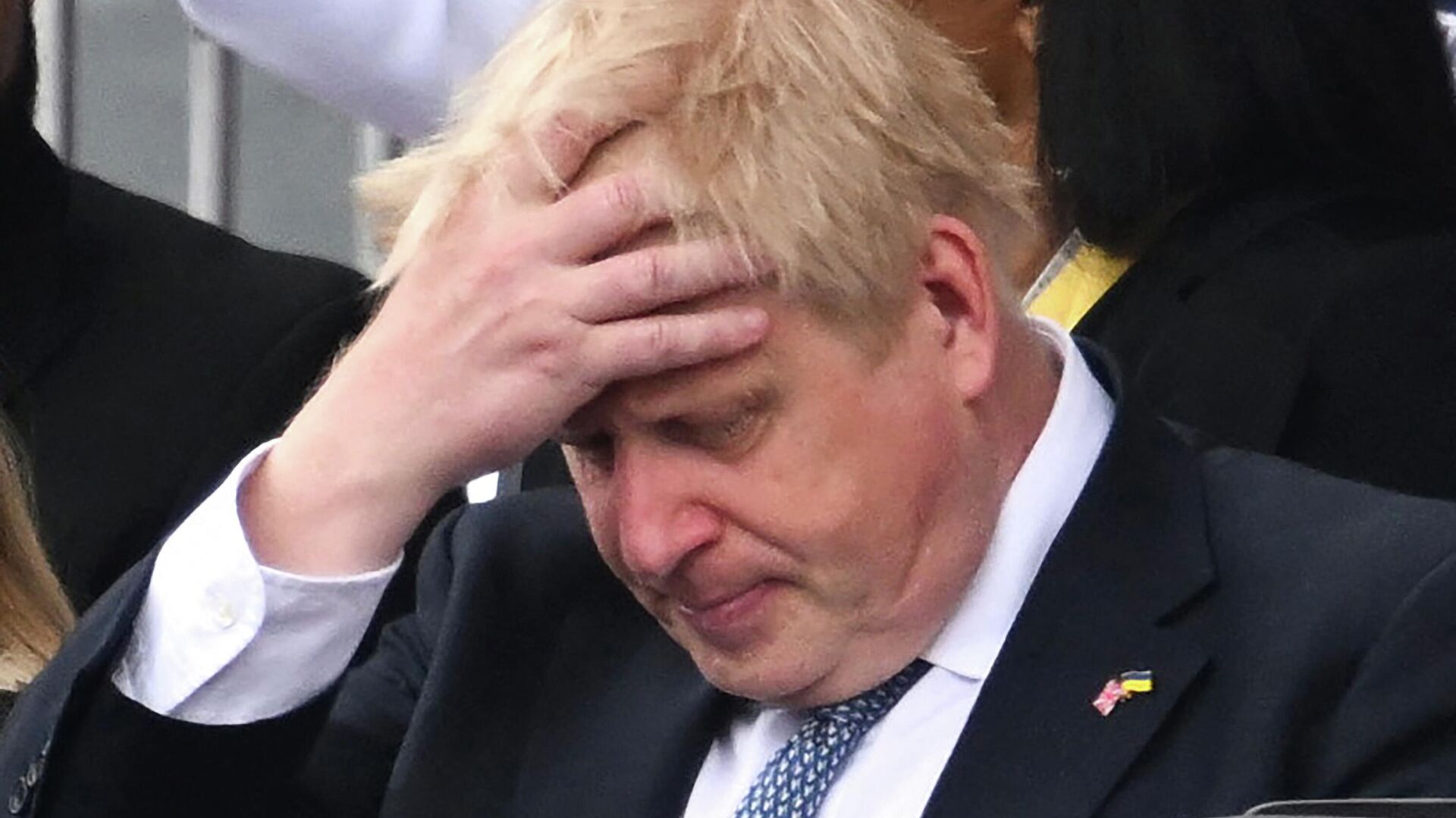https://sputnikglobe.com/20220606/how-johnson-could-win-a-no-confidence-vote-but-still-lose-power-1096048601.html
How Johnson Could Win a No-Confidence Vote But Still Lose Power
How Johnson Could Win a No-Confidence Vote But Still Lose Power
Sputnik International
Boris Johnson's predecessor Theresa May won a similar vote in December 2018. She announced her resignation six months later in May 2019, however, following... 06.06.2022, Sputnik International
2022-06-06T12:21+0000
2022-06-06T12:21+0000
2023-05-28T15:19+0000
boris johnson
1922 committee
british conservative party
britain
great britain
brexit
sir graham brady
united kingdom (uk)
https://cdn1.img.sputnikglobe.com/img/07e6/06/06/1096046028_0:229:2987:1909_1920x0_80_0_0_ae1d454bfa294ae33b1f7fb81fff5585.jpg
Prime Minister Boris Johnson could win a vote of no-confidence in his leadership this evening — but that is no guarantee that he can cling to power.Sir Graham Brady, chairman of the Conservative Party's backbench 1922 committee, announced on Monday morning that the threshold of 54 — 15 per cent of the party's current 359 MPs — who had submitted letters calling for a no-confidence vote in the leader had been reached and that a ballot would take place that evening.Unlike in the opposition parties, the process is ruthlessly simple: if enough MPs call for a vote, a simple majority can force an internal leadership election that can change the party's chief — and the head of government when it is in power.What happens if the famed 'BoJo mojo' fails to carry him through is more complicated, since the rules for Conservative leadership elections have been changed several times since the first formal contest was held in 1965.In Tory leadership elections between 1965 and 1990, that installed and then removed Edward Heath and his successor Margaret Thatcher, candidates had to win a vote of sitting party MPs by a margin of 15 per cent — later tightened up to exclude abstentions and spoiled ballots — to avoid a second round.But by the time of the 2019 contest that brought Johnson to power on the promise of completing Britain's exit from the European Union, the vote of MPs merely whittled down the field to two candidates to be decided by a ballot of all party members. The party constitution allows up to four candidates on the final ballot, providing they win the votes of at least five per cent of MPs in the first round and 10 per cent in the second.Winning and LosingPaul Goodman, editor of the grassroots Tory party website Conservative Home, predicts Johnson will win Monday's vote easily — but that won't necessarily save the bacon of the "greased albino piglet", as former PM David Cameron once called him.Goodman pointed out in an article on Monday Morning that almost half of the 359 Tory MPs are on the government "payroll" as cabinet ministers, junior ministers, Parliamentary private secretaries and in other official posts, and would therefore be expected to back their boss.Johnson's anti-corruption Tsar John Penrose, however, was the first to resign ahead of Monday evening's vote.He stressed that BoJo's predecessor Theresa May won the vote when she was put in the same position in December 2018 over her attempts to push a 'soft Brexit' deal through Parliament. May announced her resignation six months later in May 2019 under pressure from her own party, after the newly-formed Eurosceptic Brexit Party bet the Conservatives into fourth place in the final UK elections to the European Parliament.For her part, Thatcher easily won the surprise 1989 leadership challenge from backbencher Sir Anthony Meyer and came first in the voting the following year when Michael Heseltine made his bid. But her failure to win by the 15 per cent margin needed to avoid a second round, followed by private talks with her own ministers, promoted her to bow out after 11 years in the top job.Snap Election on the Cards?If the number of Tory MPs voting against Johnson is high enough, the opposition could feel emboldened to push for a no-confidence vote in the government as a whole. The 54 backbenchers who called for a vote would be enough to overturn the government's 80-seat majority — if at least 40 of them sided with Sir Keir Starmer's Labour Party.This scenario would trigger a snap general election just as Labour achieved a slight lead in the polls for the first time in three years, potencially putting many of the Tory rebels at risk of losing their jobs and handing the opposition the keys to Downing Street.Any Tory MP who voted with the opposition on such a motion would most likely have the party whip withdrawn, meaning immediate de-selection from their seat, forcing them to stand as an independent with little chance of re-election.The British Parliamentary-based system of government makes it far easier for the ruling party to change horses midstream but swapping one leader — and PM — for another, as happened with May, Cameron, Tony Blair, Thatcher and Harold Wilson over the previous 50 years. Starmer may himself be forced to resign if an investigation by the Durham Constabulary into claims he partied with 20 local Labour activists during the lockdown results in him having to pay a fine.
https://sputnikglobe.com/20220604/a-very-english-coup-leaked-emails-reveal-ex-mi6-and-military-officials-plot-to-install-bojo-1096014851.html
britain
great britain
united kingdom (uk)
Sputnik International
feedback@sputniknews.com
+74956456601
MIA „Rosiya Segodnya“
2022
James Tweedie
https://cdn1.img.sputnikglobe.com/img/07e4/08/1c/1080307270_0:3:397:400_100x100_80_0_0_7777393b9b18802f2e3c5eaa9cbcc612.png
James Tweedie
https://cdn1.img.sputnikglobe.com/img/07e4/08/1c/1080307270_0:3:397:400_100x100_80_0_0_7777393b9b18802f2e3c5eaa9cbcc612.png
News
en_EN
Sputnik International
feedback@sputniknews.com
+74956456601
MIA „Rosiya Segodnya“
Sputnik International
feedback@sputniknews.com
+74956456601
MIA „Rosiya Segodnya“
James Tweedie
https://cdn1.img.sputnikglobe.com/img/07e4/08/1c/1080307270_0:3:397:400_100x100_80_0_0_7777393b9b18802f2e3c5eaa9cbcc612.png
boris johnson, 1922 committee, british conservative party, britain, great britain, brexit, sir graham brady, united kingdom (uk)
boris johnson, 1922 committee, british conservative party, britain, great britain, brexit, sir graham brady, united kingdom (uk)
How Johnson Could Win a No-Confidence Vote But Still Lose Power
12:21 GMT 06.06.2022 (Updated: 15:19 GMT 28.05.2023) Boris Johnson's predecessor Theresa May won a similar vote in December 2018. She announced her resignation six months later in May 2019, however, following pressure from her own party amid growing public dissatisfaction with her attempt to force through a 'soft Brexit.
Prime Minister Boris Johnson could win a vote of no-confidence in his leadership this evening — but that is no guarantee that he can cling to power.
Sir Graham Brady, chairman of the Conservative Party's backbench 1922 committee, announced on Monday morning that the threshold of 54 — 15 per cent of the party's current 359 MPs — who had submitted letters calling for a
no-confidence vote in the leader had been reached and that a ballot would take place that evening.
Unlike in the opposition parties, the process is ruthlessly simple: if enough MPs call for a vote, a simple majority can force an internal leadership election that can change the party's chief — and the head of government when it is in power.
What happens if the famed 'BoJo mojo' fails to carry him through is more complicated, since the rules for Conservative leadership elections have been changed several times since the first formal contest was held in 1965.
In Tory leadership elections between 1965 and 1990, that installed and then removed Edward Heath and his successor Margaret Thatcher, candidates had to win a vote of sitting party MPs by a margin of 15 per cent — later tightened up to exclude abstentions and spoiled ballots — to avoid a second round.
But by the time of the 2019 contest that brought Johnson to power on the promise of completing Britain's exit from the European Union, the vote of MPs merely whittled down the field to two candidates to be decided by a ballot of all party members. The party constitution allows up to four candidates on the final ballot, providing they win the votes of at least five per cent of MPs in the first round and 10 per cent in the second.
Paul Goodman, editor of the grassroots Tory party website
Conservative Home, predicts Johnson will win Monday's vote easily — but that won't necessarily save the bacon of the "greased albino piglet", as former PM David Cameron once called him.
Goodman pointed out in an article on Monday Morning that almost half of the 359 Tory MPs are on the government "payroll" as cabinet ministers, junior ministers, Parliamentary private secretaries and in other official posts, and would therefore be expected to back their boss.
Johnson's anti-corruption Tsar John Penrose, however, was the
first to resign ahead of Monday evening's vote.
He stressed that BoJo's predecessor Theresa May won the vote when she was put in the same position in December 2018 over her attempts to push a 'soft Brexit' deal through Parliament. May announced her resignation six months later in May 2019 under pressure from her own party, after the newly-formed Eurosceptic Brexit Party bet the Conservatives into fourth place in the final UK elections to the European Parliament.
For her part, Thatcher easily won the surprise 1989 leadership challenge from backbencher Sir Anthony Meyer and came first in the voting the following year when Michael Heseltine made his bid. But her failure to win by the 15 per cent margin needed to avoid a second round, followed by private talks with her own ministers, promoted her to bow out after 11 years in the top job.
Snap Election on the Cards?
If the number of Tory MPs voting against Johnson is high enough, the opposition could feel emboldened to push for a no-confidence vote in the government as a whole. The 54 backbenchers who called for a vote would be enough to overturn the government's 80-seat majority — if at least 40 of them sided with Sir Keir Starmer's Labour Party.
This scenario would trigger a snap general election just as Labour achieved a slight lead in the polls for the first time in three years, potencially putting many of the Tory rebels at risk of losing their jobs and handing the opposition the keys to Downing Street.
Any Tory MP who voted with the opposition on such a motion would most likely have the party whip withdrawn, meaning immediate de-selection from their seat, forcing them to stand as an independent with little chance of re-election.
The British Parliamentary-based system of government makes it far easier for the ruling party to change horses midstream but swapping one leader — and PM — for another, as happened with May, Cameron, Tony Blair, Thatcher and Harold Wilson over the previous 50 years.
Starmer may himself be forced to resign if an
investigation by the Durham Constabulary into claims he partied with 20 local Labour activists during the lockdown results in him having to pay a fine.





